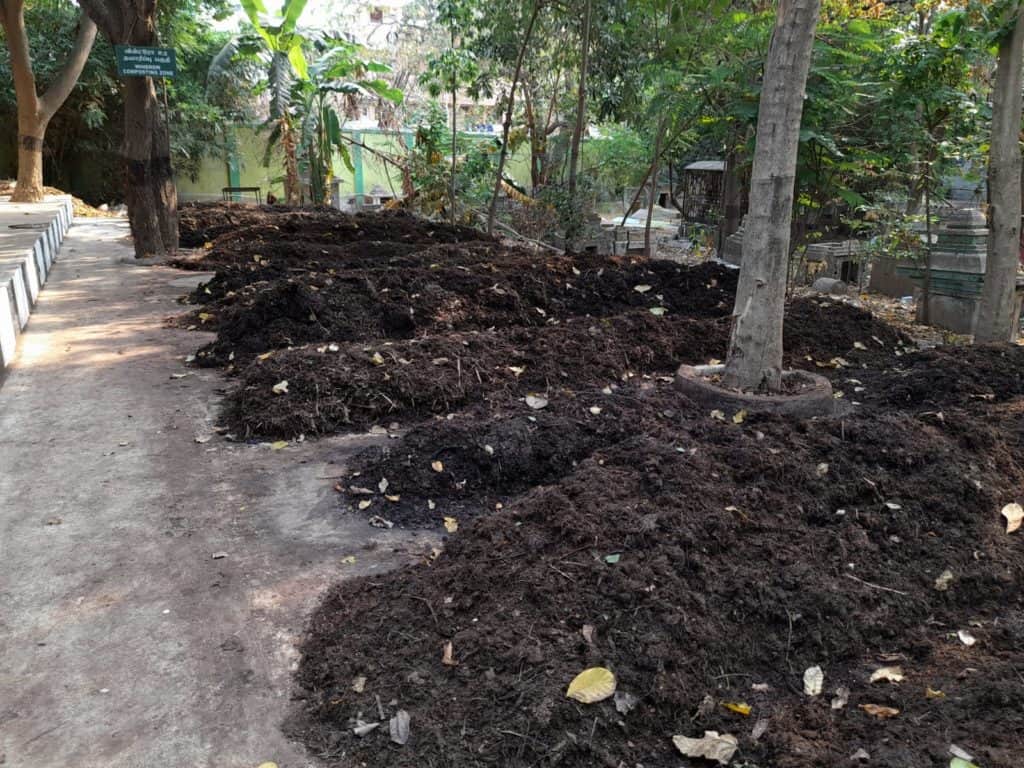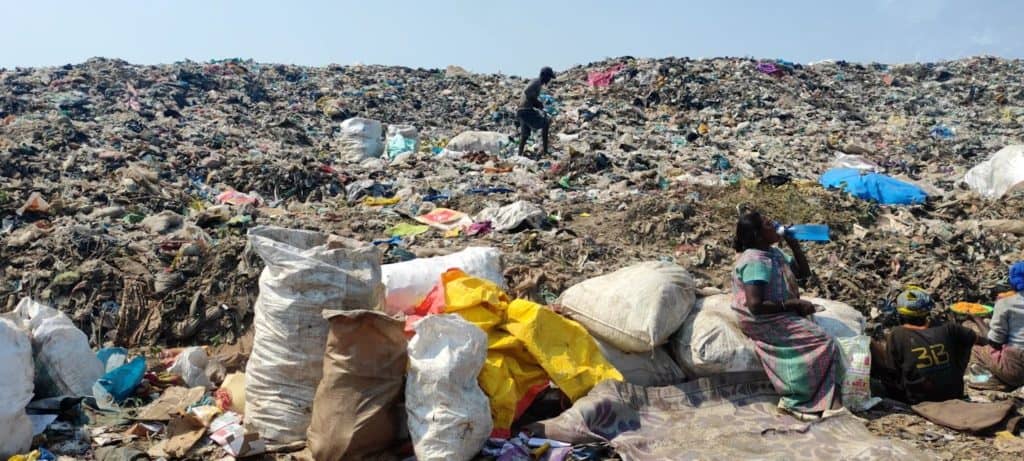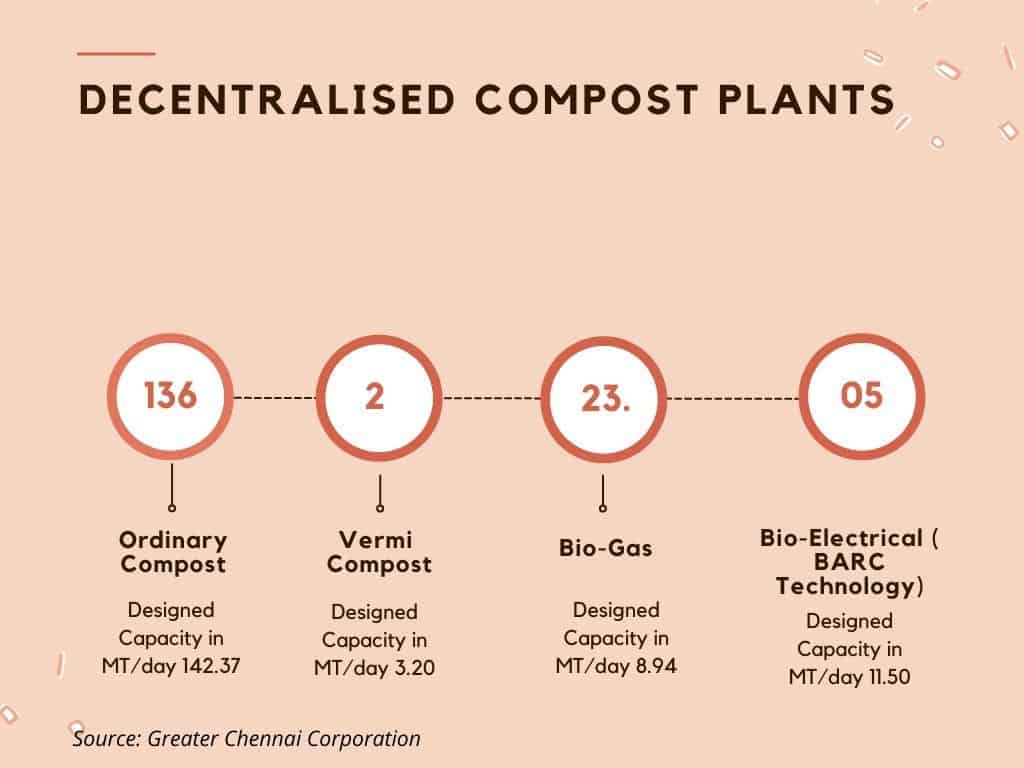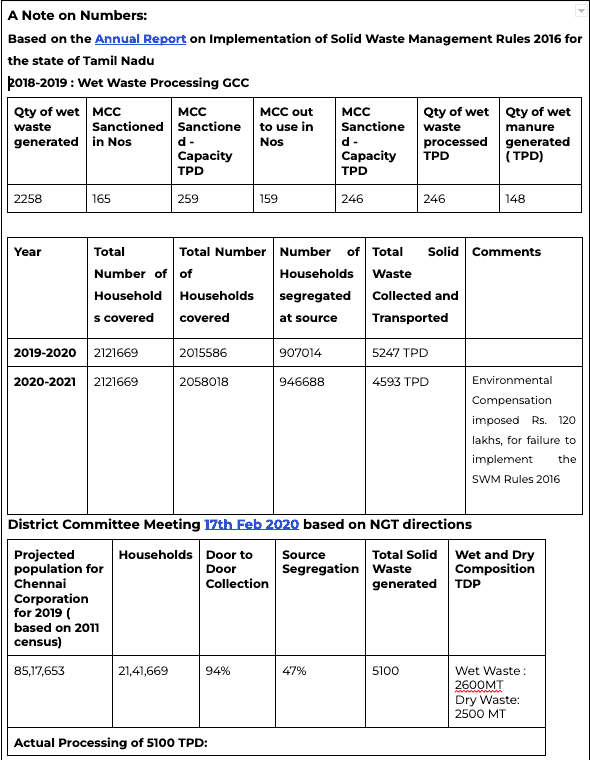Mayor R Priya presented the annual budget 2022-23 for the Greater Chennai Corporation (GCC) on April 9th 2022. The budgetary allocations for solid waste management are based on the premise of effective segregation on the ground, but what are the present realities?
“Waste Management in Chennai city is much the same as before, in some places people segregate waste and in some gated communities people manage their wet waste using in situ composting. Colour coded bins are the new addition and uniforms have changed. GCC has not been able to enforce the Solid Waste Management Rules 2016”, says P. Natarajan, Founder Namma Ooru Foundation, a not-for-profit organisation, working on decentralised solid waste management in Chennai.
As per the orders of the Honourable National Green Tribunal (NGT) in A No. 606 of 2018 dated 2nd July 2022), the Tamil Nadu Pollution Control Board imposed an environmental compensation of Rs. 120 lakh on the GCC for failure to implement the Solid Waste Management Rules 2016.
What the numbers say
GCC generates approximately over 5600 tonnes of waste every day and till recently it followed a system of collection, transportation and dumping mixed waste. As per the 2021 annual report of the TNPCB, of the total number of households – 21,21,669 in Chennai, around 20,58,018 households are covered under door to door service and only 9,46,688 households give out segregated waste.
The Greater Chennai Corporation (GCC) is divided into 15 zones and has 200 wards. In an attempt to move towards decentralisation, GCC set up Micro Composting Centres (MCCs) for biodegradable waste and Material Recovery Facilities (MRFs) for non biodegradable waste. However, collection is not uniform and no reliable data is available to track the extent of waste processed in each of these wards and on what basis the facilities have been set up.
The GCC website states that 3600 tons of garbage reaches the seven transfer stations and that presently garbage generated in Chennai is dumped at two landfills in Kodungaiyur and Perungudi.
Whom are the bins for?
In October 2020 a new waste management company URBASER SUMEET was hired for seven zones containing 86 divisions in Teynampet, Kodambakkam, Valasaravakkam, Alandur, Adyar, Perungudi and Sholinganallur to collect and transport wastes, for eight years at a cost of Rs. 447 crore per year.
The other company Ramky Enviro Engineers Ltd (REEL) has been given a similar contract for seven years to manage Tiruvottriyur, Manali, Madhavaram, and Ambattur in 2021.
The GCC in its budget has allocated Rs. 2.90 crores for the purchase of 16,500 plastic bins, for Tondiarpet, Royapuram, Thiruvikanagar and Anna Nagar. According to Vamsi Sankar Kapilavai, Senior Researcher, Citizen Consumer and Civic Action Group (CAG), “These zones are directly under the purview of the GCC. These are the roadside blue and green wheeled bins.”
Read more: Can Chennai ever become a bin-less city?
Decentralised incineration vs decentralised waste management
The budget has earmarked that 16,500 metric tonnes of non-biodegradable plastic waste, will be disposed of by using incinerators, in order to reduce the burden on landfills. “In 2019, the GCC had put up the first incinerator at Manali, by MAK Incinerator at a cost of Rs. 65 crore. The incinerator was expected to process 10 tonnes of dry waste in 20 hours. The GCC had plans of putting up additional plants in different zones in the city. The problem though is that decentralised incineration is not decentralised waste management,” says Vamsi.
The Annual Report on Implementation of Solid Waste Management Rules 2016 for the state of Tamil Nadu 2020-21 states that the Tamil Nadu Pollution Control Board has not issued consent to operate any incineration plants under the Water Pollution Prevention and Control Act and Air Pollution Prevention and Control Act to any of the plants.
The GCC is also targeting the sale of 2600 metric tonnes of non-biodegradable plastic waste to cement factories after being processed by baling machines. Interestingly the Plastic Waste Management Rules 2022 Rules clearly states that only those waste that cannot be recycled, must be sent in for end of life disposal such as waste to road, waste to oil or cement kilns.
“The concern is that Indian cities don’t hold polluting brands accountable. In an ideal system the cost borne by the city or any other associations of informal collectors or service vendors and part of the processing cost borne by the cement kilns should be reimbursed by the brand owners, manufacturers and importers to be truly held accountable,” says Karthik Natrajan, Project Manager – Recycling, Hasiru Dala.
Composting facilities and targets

The civic body is aiming at an ambitious target of 1200 metric tonnes of compost for the year through wet waste composting. In addition, they plan to operationalise a bio-gas plant in Madhavaram.
“The numbers don’t add up”, says Vamsi. “In general, 1000 Kg of compostable waste gives 100 Kg of compost. So to generate 1200 metric tonnes of compost the city has to compost 120000 tonnes of compostable waste. If this target is for one year, I’m not sure how they are going to reach it”.
For 2018-19, the Tamil Nadu Annual Report on SWM observed that of 165 micro composting centres sanctioned at a capacity of 259 TPD, only 159 with a capacity of 246 TPD were put into use and from this only 148 TPD compost is being generated. But the GCC website numbers do not correlate with what’s been submitted to the Pollution Control Board, as one can see from the following graphic:
Read more: What do we do with Chennai’s legacy waste?
Biomining of landfills
The budget also states that biomining of Perungudi landfill will be carried out with an allocation of Rs 350.65 crore from the Swacch Bharat Scheme. However, in 2019-20 the state budget had allocated Rs 5,259 crore to remediate and reclaim existing landfills in Kodungaiyur and Perungudi and also to set up waste-to-energy plants. Biomining work began in Perungudi in October 2021 and is expected to go on for 39 months. According to the TN annual report, for Perungudi, the total funds required are to the tune of Rs. 35064.59 crores.
In the submission to District Committee meeting on January 23, 2020 , based on National Green Tribunal’s direction, the GCC stated that the average generation of waste was 5100 tonnes per day, of which wet waste was about 2600 MTPD and dry waste was about 2500 MTPD. Of the total waste generated, 4500 tonnes of mixed waste was being sent to landfills and of the balance 600 tonnes, about 461 tonnes of wet waste and 200 tonnes of dry waste was being processed.
The next steps for GCC
Overall, the GCC needs to reassess the solid waste management operations in the city. While well-intentioned decentralised infrastructure has been built, currently these facilities are underutilised. GCC will have to step up segregation of waste at source, streamline door to-door collection of segregated waste and ensure that data is captured.
Quick fix solutions of dumping and burning waste is not just capital intensive, but is also a disincentive to segregation. Consequently, it dilutes the spirit of decentralisation and makes Chennai noncompliant with what the Solid Waste Management Rules 2016 lays down.
“While Chennai has taken steps towards decentralised waste management, by recognising bulk generators and empanelling service vendors, what is now needed is for the authorities to focus on managing waste, especially through in house or in campus management of wet and dry waste”, says Wilma Rodriques, Founder and CEO, Saahas Zero Waste
“The SWM Rules 2016, clearly calls for three way segregation of waste at source and each waste has clear destinations. In the case of Chennai, organic waste at the micro compost centres, dry waste at the material recovery facilities. In a ward, approximately you will receive 7 to 8 tonnes of compostable waste and 2 to 3 tons of recyclable waste, if we are able to follow this properly at all wards and ensure that these waste reach their right destinations, we will not need to dump waste in the landfills”, adds Natarajan. “GCC needs to streamline MCCs, MRFs and make Bulk Generators manage their waste. This is the only way forward”.



With slight modification in the The present waste collection pattern, we can improve the quality of segregation.The dry waste must be collected once in a week instead of daily collection. This will reduce mixing of wet and dry waste. Urbaser and REEL along with the empanelled waste recyclers can conduct waste collection drive every month area wise forcollecting ewaste, old clothes,broken furnitures glass footwear pillows mattress etc. Number of street bins must be reduced which will put pressure on residents to hand over waste at doorstep. GO to penalise for non segregation must be issued with immediate effect.